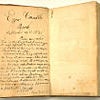Introduction: How to Write Alexandrines ...
Alexandrine is the most traditional way to write poetry in French. I think it could be considered as the French counterpart of the Japanese Haiku.
In this Instructable, I would like to teach you how to write them in English.
Step 1: What's an Alexandrine ?
.
Technically, an alexandrine is a single verse (line) of poetry, which counts a total of twelve feet (syllables).
In general, they are formed of two hemistiches (half of a verse) of six feet each.
Both hemistiches are separated by a caesura (natural pause).
So, to summarize, a traditional Alexandrine has :
- 12 feet (no more, no less)
- 2 hemistiches of 6 feet each
- a caesura in the middle
.
Step 2: Here Is an Example, a Very Simple One ...
.
First example :
When in English I speak, dictionary I keep.
Whe (1) 'n in (2) En (3) glish (4) I (5) speak (6)
(caesura)
dic (1) tio (2) na (3) ry (4) I (5) keep.(6).
In this example, both hemistiches (packs of 6 syllables) rhyme together. But that's not mandatory !
Inter-hemistiches rhymes make a single Alexandrine sound more beautiful, but that's not required. If every Alexandrine were like that, it would be like a poetry of two verses of six feet each ! And that would make, thus, Alexandrines pointless ...
Second example :
What makes a single Alexandrine beautiful is its wording, its rhythm and its poetical meaning.
For instance (not sure if it actually makes sense in English, neither if it's beautiful) :
The sky of your eyes, is a dream of freedom.
Twice 6 feet, a caesura in the middle, and no internal rhyme.
(Just in case this Alexandrine make no sense in English, its meaning is : I find your blue eyes so beautiful, that when I'm watching them, I think about the sky and about the birds that freely fly in it ... etc, given that flying like a bird is a dream, and that the person saying this sentence is probably in love, etc ...)
Third example :
Never I've seen on Earth so beautiful angel.
As you can see in this last example, the caesura is not marked by a comma. The caesura (pause) comes naturally between Earth and so. A comma between the two hemistiches is not compulsory. But there absolutely must be a caesura !
Single Alexandrines are like Haiku.
They must contains a very beautiful and poetical image. They must be pleasant to ear and to pronounce. They could also be a witty joke, etc ... But the more a single Alexandrine contains images and evocations, and the more this Alexandrine is good.
A single Alexandrine alone can be a large poem.
Step 3: Two Alexandrines, for a Single Sentence ...
.
It is also possible to say a longer phrase in two Alexandrines.
This means that our sentence must contains 4 hemistiches of 6 feet each, for a total of 24 feet.
For instance :
For a dream of freedom, maybe an illusion,
I've left my family and pray they'll pardon me.
I think that double-Alexandrines are the most difficult to write ...
You need to know what you want to say (when improvising, it's difficult), and you must respect all the Alexandrines rules without damaging the meaning and the grammar.
It could be a real challenge sometimes !
Just to write this one, it took me about ten minutes, all of that because I chose a theme (someone who leave his home to travel around the world), and refused to change it ...
.
Step 4: A Beautiful Poem, All in Alexandrine ...
.
It is, of course, absolutely possible to combine several of them to make poems.
In French, we do have several rules, different forms of poetry that I'm not going to describe. I'm just going to show you how to write poems in Alexandrines ... And you'll see that's it's quite easy ........
Free forms poems :
In free form poems, there is no special rules about rhymes.
It can be a simple sequence of Alexandrines all on a same theme.
For instance :
The sky of your eyes, is a dream of freedom.
Never I've seen on Earth so beautiful angel.
Of an other woman, how could I fall in love ?
Three Alexandrines, no internal rhymes, no external rhymes.
You can put as much Alexandrines as you want, as long as they make sense together.
Rhyming poems :
Again, there are several rules for rhymes.
I bet it's the same set of rules in every languages.
They can be "flat", "crossed", "embraced", "redoubled" etc ...
There are also several rules about how Alexandrine are grouped and sequenced (strophes).
Most commonly, they go together by quatrains (strophes of four Alexandrines).
For instance, here is a quatrain, whose rhymes are flats :
An improvisation : who knows where it will lead ? (A)
With my so French accent, I'm counting in my head. (A)
Twice six at a time, twelve syllables per line, (B)
That's how I'm used to write, all in Alexandrine. (B)
If you paid attention, you've probably noticed that the hemistiches of the third verse are not symmetric.
Twice (1) six (2) at (3) a (4) time (5)
(caesura)
twelve (1) syl (2) la (3) bles (4) per (5) line (6)
This gives us 11 feet in total, 5 feet on the first hemistiche, and 6 on the second.
Actually, time (despite it's usually a 1 syllable word), is pronounced here like a 2 syllables word. We're doing so by stressing this word like if it was two syllables long : tiiiiii (1) m' (2)
It's called a diaeresis.
I don't know if it's common in English poetry, but that's commonly tolerated in French poetry, because it's also a question of accents ...
There is also the possibility to counter-balance our hemistiches so that our Alexandrine is actually 12 feet long :
Twice six at a time and twelve syllables per line
Twice (1) six (2) at (3) a (4) time (5)
(caesura)
and (1) twelve (2) syl (3) la (4) bles (5) per (6) line (7)
Our hemistiches are not standards, but it's tolerable, more even since there is no comma before and : it's absolutely possible to put the caesura (the tiny pause when you say it) just after and :
Twice (1) six (2) at (3) a (4) time (5) and (6)
(caesura)
twelve (1) syl (2) la (3) bles (4) per (5) line (6)
... and we get our twice six feet Alexandrine.
.
Step 5: That's All ...
.
I think that's all you need to know about Alexandrines ...
I hope you liked this Instructable and that you'll write and show me some of your Alexandrines ! =o)
Bonus :
For a dream of freedom, maybe an illusion,
I've left my family, my home and my nation.
Behind the horizon, where the sky touch' the sea,
Rose a golden sun and a call of duty.
My body trapped here, my heart in motherland,
I'm feeling so alone, without hope or comfort.
It's laying on my side, and soon will take flight,
This letter never sent, escaped from my hand.
Soon the wind of desert will cover me with sand ...
For a dream of freedom, maybe an illusion,
I've lost my family, my home and my nation.
Behind the horizon, where the sky touch' the sea,
Contemplating the stars, I pray you'll pardon me.
YG2F













